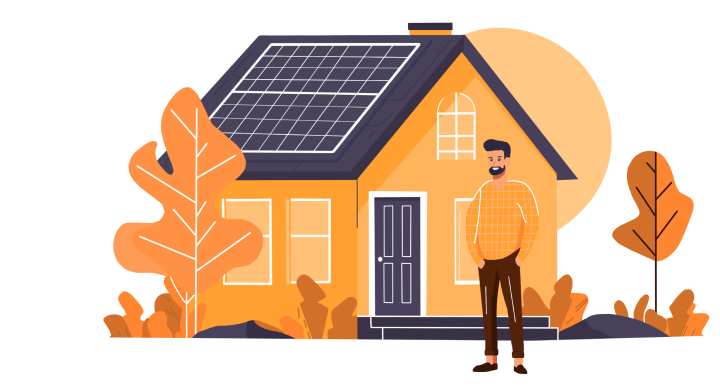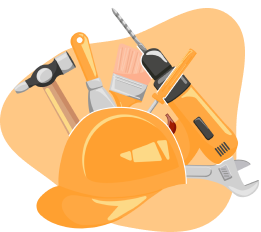Planning a home solar panel installation can seem complicated, but when you know the essentials, it's easy. Know how much sunlight your home gets throughout the year, make sure your roof is in good shape, and address any repairs before installation to avoid future issues.
When it's time to choose a reliable installer, at Solar Energy Host, we connect you with trusted local providers, making it easy to compare quotes, find the best deal, and transition to a solar-powered future.
#1: Assess your home's solar power potential.
Measure how much sunlight your location gets throughout the year.
Residential solar panels perform most efficiently in areas with plenty of direct sunlight.
Use online tools to estimate how many hours of sunlight your area receives daily. This step will help you decide if a home solar panel installation can generate enough energy to meet your household's solar energy installation needs.
Additionally, taking into account seasonal variations in sunlight can help plan for fluctuations in energy production, especially in areas with notably erratic weather patterns.
See that your roof is unobstructed by trees or neighboring buildings.
Proper panel placement can greatly improve the output and efficiency of your solar power setup. Solar panels require direct sunlight to produce optimal energy. Shadows can significantly reduce the amount of electricity your panels generate.
Check your roof for any shadows caused by nearby trees, chimneys, or buildings, especially during peak sunlight hours. Consider trimming any overhanging trees or selecting an alternative home solar panel installation site if needed.
Use solar potential calculators to estimate energy savings.
By using a solar calculator, you can input your home's specific details—such as roof size, angle, and electricity usage—to generate estimates for energy production and savings before your home solar panel installation.
These estimates can help you make the best decision for yourself regarding the system size that will meet your energy needs and give you a clearer picture of how much you can expect to save on your energy bills over time.
#2: Check if your roof is suitable for solar panels.
Make sure your roof is in good condition and structurally ready.
Address any repairs or upgrades before your solar system installation to avoid costly issues later on and ensure that your solar investment remains protected.
Since solar panels are a long-term investment, lasting upwards of 25 years, it's essential that your roof is in good condition before home solar panel installation. Check for any damage, such as leaks or structural weaknesses, that could compromise the panels over time.
If needed, you can schedule a roof inspection with a professional to ensure that it can support the weight of the solar system.
Ensure your roof's angle and orientation are optimal for capturing sunlight.
Solar panels work best when installed at the correct angle and orientation relative to the sun.
For optimal efficiency, the angle of your roof should match your geographical latitude, and the panels should ideally face the equator—either south in the northern hemisphere or north in the southern hemisphere.
If your roof doesn't naturally align this way, there are home solar power mounting solutions that can adjust the tilt of the panels. Maximizing the angle and orientation can drastically improve the energy output of your solar system.
You need enough surface area for the number of panels required to meet your energy needs.
Solar systems are typically sized based on your household's energy consumption, the size of your roof, and the available surface area. Solar panel options for small homes could also be arranged.
It is important that you have enough space on your roof to install the number of panels necessary to generate sufficient electricity. If roof space is limited, consider alternative solutions, such as ground mount solar installation or high-efficiency panels that produce more energy in a smaller footprint.
#3: Find the best solar installation deals with Solar Energy Host.
Solar Energy Host connects you with trusted local solar installers for a hassle-free experience.
You deserve solar experts who know your local landscape. Solar Energy Host simplifies the process of finding reliable and highly rated solar installers in your area.
By entering a few details about your home and energy needs, you'll be matched with local installers who offer competitive pricing and top-tier service. This ensures that your solar project is handled by professionals who understand local regulations, home solar panel installation best practices, and how to optimize your solar power system for long-term success.
Compare multiple quotes to find the most competitive offer.
One of the biggest advantages of using Solar Energy Host is the ability to compare multiple quotes in one place. You can review detailed proposals for solar installation service options from different installers, allowing you to assess solar panel cost, equipment quality, warranties, and service offerings side by side.
We can save you time and effort while helping you make an informed decision based on your budget and specific energy needs. With everything laid out clearly, you won't have to contact multiple companies individually to get the best deal on your home solar panel installation.
Start saving on your electricity bills with confidence.
Solar Energy Host has helped countless homeowners switch to renewable energy and save big on their electricity bills. Our platform connects you with trusted professionals, helping you achieve long-term energy savings while reducing your carbon footprint.
Get a streamlined, transparent, and reliable solar installation process. Start saving with confidence and do some good for the environment through Solar Energy Host.
Frequently Asked Questions (FAQ)
What is the return on investment (ROI) for solar panels?
The ROI for solar panels depends on several factors. Your energy consumption, local electricity rates, and the typical solar panel installation cost all impact ROI.
On average, homeowners can expect to get their money back within 5 to 10 years. Plus, government incentives and rebates can shorten this payback period significantly. Over the system's 25+ year lifespan, the savings from reduced electricity bills can add up to a substantial return.
Can I use solar panels to power a pool or hot tub?
Yes, solar panels can power a pool or hot tub. Pools and hot tubs consume a lot of electricity, particularly for heating and filtration systems. By installing a solar panel setup sized to your overall energy needs, including your pool or hot tub, you can significantly offset these energy costs.
Some homeowners also use solar pool heating systems, which utilize a separate set of solar collectors designed specifically for heating water.
How do solar batteries work, and are they worth the investment?
A solar battery provides a way to use your solar energy more efficiently. They store excess energy generated by your solar panels.
During the day, your solar panels may produce more electricity than your home consumes. This excess energy is stored in the battery for later use when your solar panels aren't generating electricity at night or during prolonged cloudy periods.
Save more with every sunrise.
At Solar Energy Host, we simplify your transition to solar energy. As your trusted partner, we connect you with the best solar installers, ensuring you receive competitive quotes tailored to your home's needs.
With our straightforward and secure platform, you can effortlessly compare options and make informed decisions. Start saving today with Solar Energy Host!














